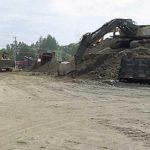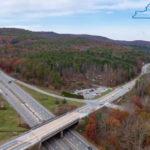Shapley (front): “How could a whole city lose its drinking water supply?”
POUGHKEEPSIE – Hudson Valley Riverkeeper and elected officials from seven Hudson River shore communities announced on Thursday an initiative to protect the approximately 100,000 people served with drinking water from the river. They don’t want to happen to them what occurred in Newburgh with that city’s tainted water supply.
Following a study commissioned by Riverkeeper, conducted by the Center
for Watershed Protection, recommendations were made to start an intermunicipal
council, update surveys of watershed lands and investigate the impacts
of a possible oil spill, or other pollution sources within the Hudson.
Riverkeeper has developed a “Drinking Source Water Protection Scorecard”
to assess these variables on an individual community basis which was used
to conduct the study.
The municipalities involved – the City and Town of Poughkeepsie,
Village and Town of Rhinebeck and the towns of Esopus, Hyde Park, and
Lloyd ,maintain they are committed to protect their precious water sources.
Poughkeepsie Mayor Robert Rolison noted water is the lifeblood of any community.
“We need to know, as municipal folks and people that live in our communities that depend on this water that they have safe drinking water all the time because there are lots of other things that we have to do in the mission of government,” Rolison said. “Probably the first thing, and the most important thing, is water. It’s the lifeblood of our communities.”
Dan Shapley of Riverkeeper said the idea of the scorecard came as a response to the PFOS issue in Newburgh, and the lack of preparedness it indicated Hudson River communities’ have when dealing with a water crisis.
“We asked ourselves: how could a whole city lose its drinking water supply?” Shapely asked. “How could we have allowed the protection to fail for a city’s drinking water supply. We did an analysis of all the rules and regulations, and the best management practices that should be in place to protect public drinking water at its source; and so, were the failures for Newburgh. Then, we turned it into a tool that other communities could use to tick down the list and see, ‘Are we like Newburgh, in that we’re vulnerable, or, are we more like New York City, for instance, where we’ve set world class standards for protecting water at its source.”
Riverkeeper said in addition to this study, they will soon be conducting another to assess different communities’ water infrastructure needs.







